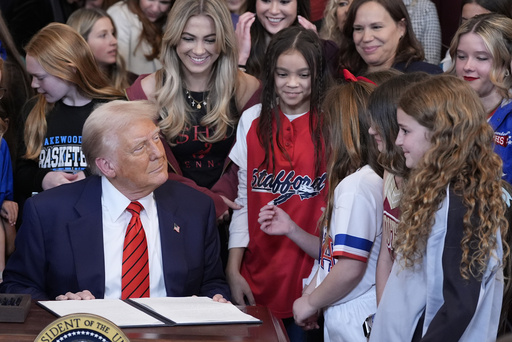
On Wednesday, President Donald Trump enacted an executive order aimed at banning transgender athletes from competing in girls’ and women’s sports. The directive, named “Keeping Men Out of Women’s Sports,” grants federal agencies considerable authority to enforce compliance among entities receiving federal funding, in line with the administration’s interpretation of Title IX, which defines “sex” based on the gender assigned at birth.
During a signing ceremony in the East Room, attended by lawmakers and supportive female athletes like former collegiate swimmer Riley Gaines, Trump declared, “With this executive order, the war on women’s sports is over.” The White House press secretary, Karoline Leavitt, stated that the order aims to “uphold the promise of Title IX,” and would prompt immediate enforcement actions against schools and athletic bodies that do not guarantee women’s access to single-sex sports and locker rooms.
The timing of this order, which aligns with National Girls and Women in Sports Day, is part of a series of executive actions from the Republican president directed at transgender individuals. Poll analyses conducted during the campaign indicated that the topic of transgender rights extended beyond party allegiance, with over half of surveyed voters expressing that governmental support for transgender rights has exceeded acceptable boundaries. Trump capitalized on this sentiment leading up to the election, promising to eliminate what he termed “transgender insanity.”
This executive order gives a clearer outline of actions, permitting the Education Department to sanction schools that allow transgender athletes to compete, framing such instances as violations of Title IX, which prohibits sexual discrimination in education settings. Schools detected in noncompliance risk losing federal funding. Enforcement of this order is set to be prioritized by the Administration, as indicated by a recent call where the acting director of the Office for Civil Rights emphasized the need for alignment with Trump’s enforcement priorities.
Since Trump took office, the Education Department has already launched an investigation into the Denver public schools regarding an all-gender bathroom that replaced a girls’ facility. Trump has also directed Secretary of State Marco Rubio to communicate a warning to the International Olympic Committee concerning the 2028 Summer Olympics slated for Los Angeles. Trump stated his firm stance that “America categorically rejects transgender lunacy,” demanding changes in Olympic policies related to transgender athletes.
Currently, the IOC has deferred the determination of transgender participation to individual sports federations. However, this could shift with the anticipated election of a new president to succeed Thomas Bach. Sebastian Coe, a former athlete now leading World Athletics, is among potential successors and has advocated for restricting female sports participation to cisgender women.
Additionally, Trump announced that Kristi Noem, Director of Homeland Security, would “deny any and all visa applications made by men attempting to fraudulently enter the United States while identifying themselves as women athletes to try and get into the Games.” Organizers for the 2028 Olympics have yet to comment on the matter.
This executive action is the most recent in a series that have marginalized transgender individuals. Previous steps have sought to invalidate the concept of gender transition within federal frameworks, influencing areas like passports and prison conditions, while also proposing to exclude transgender individuals from military service and curtailing federal health insurance for gender-affirming care for minors.
Organizations advocating for transgender rights, including the National Women’s Law Center and GLAAD, have expressed strong opposition to the order. Fatima Goss Graves, President and CEO of the National Women’s Law Center, commented, “Contrary to what the president wants you to believe, trans students do not pose threats to sports, schools or this country, and they deserve the same opportunities as their peers to learn, play and grow up in safe environments.”
Legal challenges against some of the administration’s initiatives are already underway, with lawsuits from transgender individuals claiming violations of congressional laws and constitutional protections. Further disputes are likely concerning the extent of presidential authority in mandating changes to NCAA policies.
NCAA President Charlie Baker noted that the Board of Governors is evaluating the order and intends to revise NCAA policy in the upcoming days, contingent upon further guidance from the administration. Baker also remarked that fewer than ten active NCAA athletes currently identify as transgender, suggesting that the order may at least establish a consistent approach rather than a disjointed array of state laws.
The executive order was signed a day after three former teammates of transgender swimmer Lia Thomas filed a lawsuit against the NCAA, Ivy League, Harvard, and the University of Pennsylvania, alleging conspiratorial actions to permit Thomas’s participation in championships, claiming violations of Title IX due to these actions being taken in bad faith.

